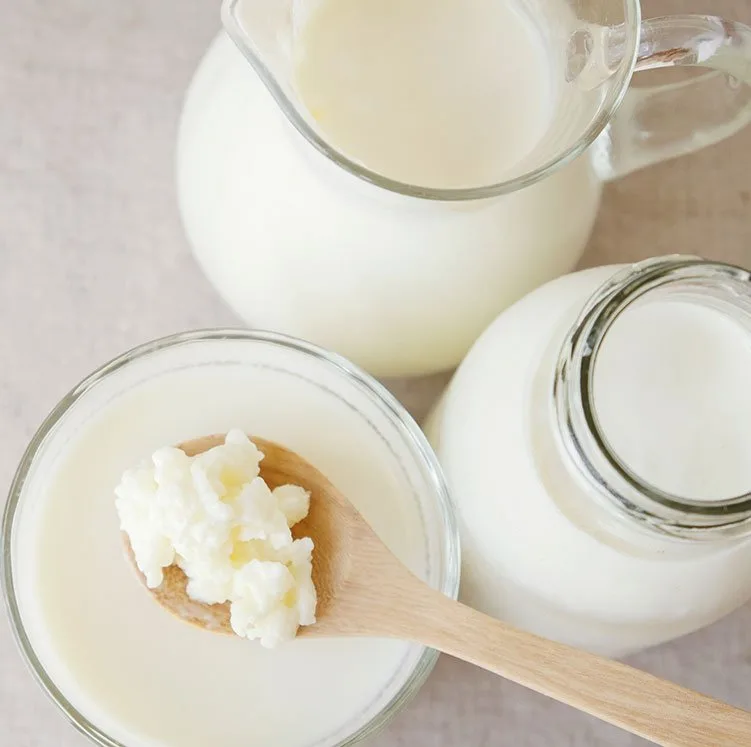When you improve your gut health, your health and longevity will improve. Which is why you need to consider Kefir in your diet. Kefir is a natural probiotic which is essential for good gut health. It’s also an affordable, easy way to boost your immunity and mood during COVID-19 times.
Why is gut health important?
We know that poor gut health is linked to poor health and even disease. Modern day lifestyles are increasingly damaging to gut health. More recently there has been a strong focus on the importance of understanding the state of your gut.
In some respects we are more bacteria than we are human
More than 100 trillion microorganisms call the GI tract home. The microbiota is responsible for extracting and synthesizing vitamins and other nutrients from our food, as well as regulating digestion and metabolism and fine-tuning the immune system. This prevents the over growth of harmful bacteria, while maintaining the integrity and barrier function of the intestinal wall.
Improve your diet and manage stress
The stomach contains both good and bad bacteria. Maintaining a balance between them is an important part of keeping the stomach healthy. Diseases, infections, and some medications, such as antibiotics, can upset this balance. If your gut health is poor, the impact is significant. There’s a great deal you can do to improve your intestinal health.
Stress will damage your gut
Science has shown that lifestyle and diet directly affect the diversity of our gut microbiota. Removing any problematic foods from the diet is important. You also have to manage stress because chronic stress suppresses the growth of beneficial bacteria. Adding more fermented and fiber-rich foods to the diet and taking a probiotic supplement can also do wonders.
5 health benefits of taking a daily probiotic:
1. Promotes digestive health
If the bacteria in your gut is unbalanced, you may experience abdominal cramps, nausea, bloating, diarrhea, constipation and other frequent symptoms. Probiotics promote regular bowel movements, preventing constipation and diarrhea, reducing the risk of colon cancer, and improving overall digestive comfort.
2. Supports the immune system
Considering that 70-80% of your immune cells exist in your gastrointestinal tract, it’s no wonder probiotics will positively influence your immune system. In fact, there are several clinical trials that describe the activity of important cells of the immune system, such as phagocytic and natural killer cells. These studies show that probiotics significantly improve the activity of these cells, which demonstrates that probiotics contribute to the strengthening of the body’s natural defenses.
3. Improves mental health
It has been estimated that 90% of the body’s serotonin (the happy hormone) is made in the digestive tract, signifying that there is a close correlation between your mental and digestive health. Recent research shows that probiotics can significantly boost your mood, easing the symptoms of depression, anxiety and stress.
4. Improves heart health
Research shows that probiotics can benefit heart health by lowering low-density lipoprotein (LDL) cholesterol, which is bad for your heart and overall health. Other studies also show that it has the potential to lower your blood pressure. Both cholesterol and blood pressure are risk factors for heart disease, but probiotics can help reduce their effects on the body.
5. Assists in weight management
Gut bacteria may also influence your body weight. A study of 210 participants7 found that 12 weeks of probiotic intake resulted in 8,5% reduction of abdominal fat. When the participants stopped taking the probiotic, they gained the fat back in 4 weeks. Therefore, regular intake of probiotics can have a significant impact on your body weight.
The case for a natural probiotic
This is where kefir can play a role. Drinking kefir which is a natural probiotic, will help your gut. This is due to the many health benefits attributed to its probiotic content. Probiotics, or “good bacteria,” are living organisms that can help maintain regular bowel movements, treat certain digestive conditions, and support the immune system.
Kefir is not yogurt
While kefir is typically made from cow’s milk, it can also be produced from the milk of other animals, such as goats or sheep, or from non-dairy milks. While yogurt is the fermentation of bacteria in milk, kefir is a combination of bacteria and yeast fermentation. The combination of bacteria and yeast is called “kefir grain.”
Why is kefir such a great probiotic?
According to Medical News Today, kefir’s many health benefits are still being researched, but it has many potential benefits. They list these seven benefits:
1. Helps control blood sugar
In 2015, a small study compared the effects of consuming kefir and conventionally fermented milk on blood sugar levels in people with diabetes. Participants who consumed kefir had significantly lower fasting blood sugar levels than those who consumed conventionally fermented milk.
2. Combats bad cholesterol
A 2017 study looked at changes in cholesterol levels among women drinking low-fat milk or kefir. The participants drank either 2 servings a day of low-fat milk, 4 servings a day of low-fat milk, or 4 servings a day of kefir.
The probiotic in kefir is effective
After 8 weeks, those who drank kefir showed significant decreases in their total and their “bad cholesterol” levels compared to those who drank only 2 servings per day of low-fat milk. Participants who consumed 4 servings per day of low-fat milk also had lowered cholesterol levels. The probiotic factor in kefir may play a role in how much cholesterol the body absorbs from food. They may also affect how the body produces, processes, and uses cholesterol.
3. Is nutritious
Generally speaking, it is a good source of protein, calcium, and potassium. Some store-bought brands are fortified with vitamin D, as well. However, the nutrients in kefir depend on the type of milk used to make it.
 4. Improves lactose tolerance
4. Improves lactose tolerance
People with lactose intolerance may be able to consume kefir without experiencing symptoms, as the bacteria present in kefir break down much of the lactose. A small study in 2003 concluded that the consumption of kefir improved lactose digestion over time. This could potentially be used to help overcome lactose intolerance.
5. Better digestive health
Kefir may be able to help treat digestive issues, such as diarrhea or lactose intolerance. There’s some evidence that probiotic foods, such as kefir, can help treat diarrhea caused by an infection or antibiotics. One review also cited the use of kefir to aid the treatment of peptic ulcers in the stomach and small intestine.
6. Has anti-fungal properties
Laboratory studies have shown kefir may have antibacterial and antifungal properties, although more investigation is needed. Research shows that kefir has the potential to be beneficial against gastroenteritis, vaginal infections, and yeast infections. Another review demonstrated beneficial effects of kefir on mice for wound healing and reduced tumor growth.
7. Helps control weight
Another study reported that kefir consumption reduced body weight and total cholesterol in obese mice.
Medical News Today suggests more research on people is required.
Full of vitamins and minerals
According to Healthline, kefir is full of vitamins and minerals. A 6-ounce (175-ml) serving of low-fat kefir contains (2Trusted Source):
- Protein: 4 grams
- Calcium: 10% of the RDI
- Phosphorus: 15% of the RDI
- Vitamin B12: 12% of the RDI
- Riboflavin (B2): 10% of the RDI
- Magnesium: 3% of the RDI
- A decent amount of vitamin D
Another big plus is that kefir is low in calories
In addition, kefir has about 100 calories, 7–8 grams of carbs and 3–6 grams of fat, depending on the type of milk used.
What is the difference between kefir and yogurt?
According to BC dairy yogurt and kefir are both nutritious fermented milk products, but there are three main differences:
- Yogurt is cultured by adding bacteria to milk. Kefir is cultured by adding bacteria AND yeast to milk.
- Yogurt needs to be cultured at warm temperatures whereas kefir is cultured at room temperature.
- Kefir is typically thinner than yogurt, and can be consumed as a beverage, although both make great additions to a smoothie!
Can people with lactose intolerance drink kefir?
Both yogurt and kefir are usually well tolerated by people with lactose intolerance because both contain live cultures that help to break down the milk sugar (lactose).
How is kefir made?
BBC Good Food explains the method used to make kefir is one of the main differences between kefir and yogurt. Traditional milk kefir uses kefir grains and whole cow’s milk. It is also made from goat’s milk, sheep’s milk and coconut milk as well as from rice and soy milk alternatives. Kefir grains are not grains at all. They are small gelatinous beads that look like grains and they contain a variety of bacteria and yeasts.
A homemade probiotic
Did you know it is easy enough to make Kefir at home? The grains are placed in a glass jar or bowl, soaked in milk, covered and left at room temperature for a minimum of 24 hours. This enables the bacteria and yeast to ferment the lactose (natural sugar in milk) into lactic acid, activating the bacteria to proliferate and grow.
The Bottom Line
Kefir is a natural probiotic that’s great for gut health. Admittedly it has a tart taste, but its health benefits are just too good to be ignored. It’s also affordable and can be made at home. Need any more convincing? Kefir should definitely be part of your daily health regime.
Make your own kefir
Kefir is tangy, about as thick (and creamy!) like a smoothie. If you are unsure about the quality of store-bought kefir, you can easily make it at home. Kefir grains are available in some health food stores and supermarkets, as well as online. You can also find many blog posts and videos that teach kefir production, but the process is very simple. Follow this recipe by The Ktichn.
READ MORE
Looking for options other than animal based milk? Read more about eco-friendly Oat Milk
References
Medical News Today: Seven Benefits of Kefir https://www.medicalnewstoday.com/articles/318353
Healthline: 9 Health Benefits of Kefir https://www.healthline.com/nutrition/9-health-benefits-of-kefir
BC Dairy: All About Kefir. Answers to Five Top Questions https://bcdairy.ca/milk/articles/all-about-kefir-answers-to-five-top-questions
BBC Good Food: Health Benefits of Kefir https://www.bbcgoodfood.com/howto/guide/health-benefits-kefir
The Ktichn: How to Make Milk Kefir https://www.thekitchn.com/how-to-make-milk-kefir-cooking-lessons-from-the-kitchn-202022
Scientific references
Dinan TC and Quigley EM. 2011. Probiotics in the treatment of depression: science or science fiction? Australian and New Zealand Journal of Psychiatry; 45:1023-1025. https://doi.org/10.3109%
Bested AC, Logan AC and Selhub EM. 2013. Intestinal microbiota, probiotics and mental health: from Metchnikoff to modern advances: Part II – contemporary contextual research. Gut Pathogens; 5(3). http://www.gutpathogens.com/
Agerholm-Larsen L, Bell ML, Grunwald GK and Astrup A. 2000. The effect of a probiotic milk product on plasma cholesterol: a meta-analysis of short-term intervention studies. European Journal of Clinical Nutrition; 54(11):856-60. doi: 10.1038/sj.ejcn.1601104
Khalesi S, Sun J, Buys N and Jayasinghe R. 2014. Effect of probiotics on blood pressure: a systematic review and meta-analysis of randomized, controlled trials. Hypertension; 64(4):897-903. https://doi.org/10.1161/
Y Koodia et al. Effect of Lactobacillus gasseri SBT2055 in fermented milk on abdominal adiposity in adults in a randomised controlled trial. Brit J of Nutr (2013); 110:1696–1703.




 4. Improves lactose tolerance
4. Improves lactose tolerance


![women [longevity live]](https://longevitylive.com/wp-content/uploads/2020/01/photo-of-women-walking-down-the-street-1116984-100x100.jpg)










